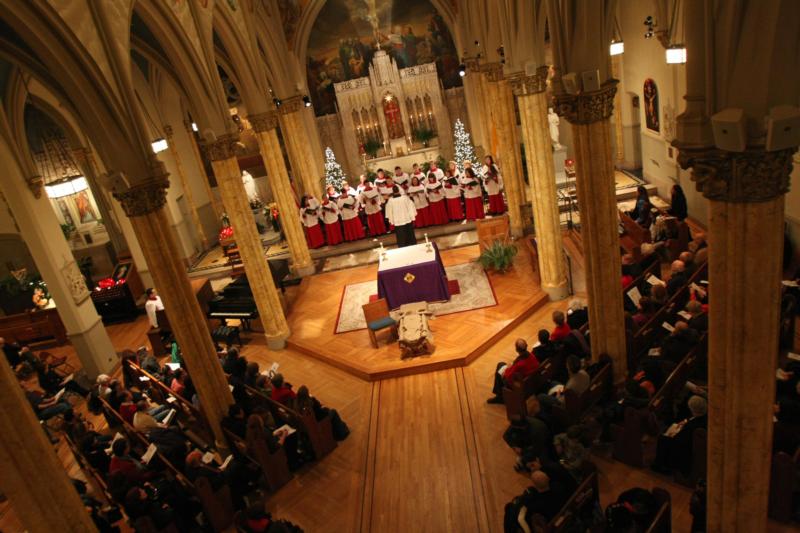
Members of the choir sing Christmas hymns, such as “O Come, O Come, Emmanuel,” at St. Malachy’s Church in New York. “O Come, O Come, Emmanuel” is a somber sounding hymn, made more solemn in the darkened church, lit only with candles as we wait for Christ’s birth. (CNS photo/Gregory A. Shemitz)
My oldest was 5 when he asked me, “Was it me or Chapman who jumped in our mommy’s tummy when we heard the other mommy’s voice?” His friend’s mother and I were pregnant with them at the same time.
“Ummm, that was John the Baptist when he heard the voice of Mary, the mother of Jesus,” I answered.
“Oh yeah. I thought it was me,” he replied, shrugging off the mix-up, returning to his coloring book.
I took pleasure that in the anticipation of Christmas, my son’s narrative was so interwoven with Christ’s he was uncertain which story was his own.
[hotblock]
“I guess John the Baptist was really happy that Jesus was going to be born,” he said, trading his purple crayon for a pink.
I laughed inside. I never thought of John the Baptist as happy. Loud, a little scary, smelly perhaps — but not joyful. But then again, why wouldn’t he be joyful?
Hadn’t John leapt for joy in his mother Elizabeth’s womb when he heard the voice of Mary? Hadn’t his birth to parents well advanced in age caused the entire neighborhood to celebrate? His birth was a miracle and shared in the joy with his parents.
John’s father Zechariah, who had been made mute by the angel Gabriel for doubting him, had his tongue loosened at John’s birth. He began singing and praising God. John was surrounded by joy from the very beginning.
Looking at John through the lens of joy, I no longer saw him as a vagrant, morosely digging in the forest for food but as a dazzling prophet, his eyes open to the glorious splendor to come. I thought of the name John meaning “God is gracious.”
[tower]
Luke says John encouraged the people and preached the good news to them. John imparted his name to the people with the promise of forgiveness to those who repent.
I started to focus less on John hollering to the crowds “Repent!” but on the moments after repentance and baptism, when God’s people felt the sweet relief of forgiveness. When they felt themselves ready for the brilliance to come.
This Sunday we’ll sing “O Come, O Come, Emmanuel” during the processional at the start of Mass: “O come, o come, Emmanuel,/ And ransom captive Israel,/ That mourns in lonely exile here.”
It’s a somber sounding hymn, made more solemn in the darkened church, lit only with candles as we wait for Christ’s birth. But just as on that first Christmas we catch a glimpse of hope: “Until the Son of God appear./ Rejoice! Rejoice! Emmanuel/ Shall come to you, O Israel!”
We are reminded that he is coming and we should be filled with joy! The readings remind us of this too.
In the Old Testament, Isaiah says: “I rejoice heartily in the Lord, in my God is the joy of my soul” (Is 61:10).
In the New Testament, St. Paul says, “Rejoice always … for this is the will of God for you in Christ Jesus” (1 Thes 5:16-18).
Yet it is the responsorial psalm that stays with me after I leave Mass. I find myself humming it throughout the day: “My soul rejoices in my God.”
The response is the song Mary sings right after Elizabeth reveals to her “the infant in my womb leaped for joy. Blessed are you who believed that what was spoken to you by the Lord would be fulfilled.”
Author Nadia Bolz-Weber writes, “Mary remind(s) us of God’s favor. Mary is what it looks like to believe we already are who God says we are.”
Mary, the first to believe, to say yes, was the first disciple and the first to show us how to respond to the call of Christ.
I see how this year’s Christmas narrative is so tightly knitted with that first Christmas. In anticipation, I prepare my heart in repentance. Then in the sweet relief of forgiveness I sing with joy, “O come, O come, Emmanuel.”
***
Gonzalez is a freelance writer. Her website is www.shemaiahgonzalez.com.
PREVIOUS: God’s greatness can be found in the little things, pope says
NEXT: Advent meditation: Joy during life’s struggles and sorrows



Share this story